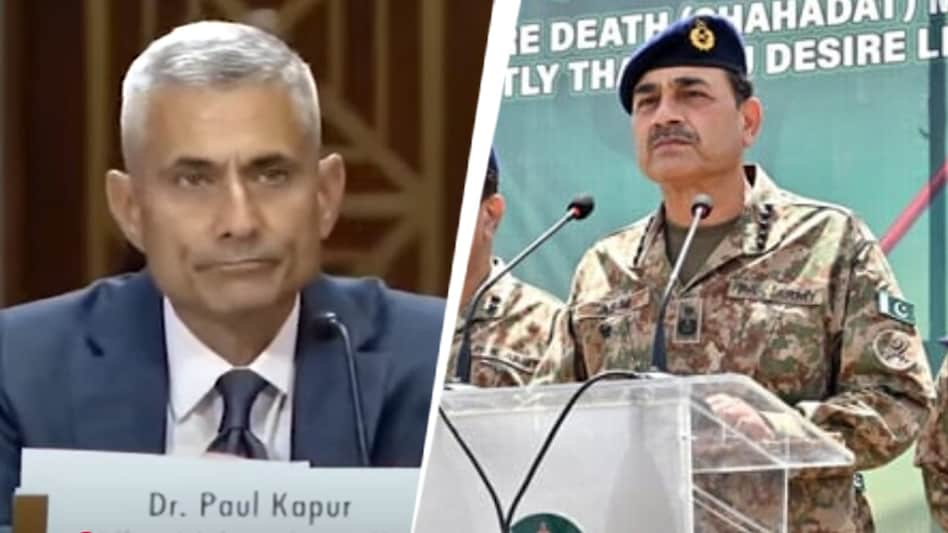 Trump’s South Asia pick warned in 2016: Pakistan may face catastrophe if it doesn't end militancy
Trump’s South Asia pick warned in 2016: Pakistan may face catastrophe if it doesn't end militancy
 Trump’s South Asia pick warned in 2016: Pakistan may face catastrophe if it doesn't end militancy
Trump’s South Asia pick warned in 2016: Pakistan may face catastrophe if it doesn't end militancyPaul Kapur, nominated as Assistant Secretary of State for South and Central Asian Affairs, may soon take charge of shaping America's policy towards a region he has studied in depth — particularly Pakistan's long-standing reliance on militant proxies. During his confirmation hearing, Kapur said, "If confirmed, I'll lead the State Department Bureau responsible for this critical part of the world. US's relationships with the countries of South and Central Asia hold great promise and with effective policy they can flourish and enable us to achieve Secretary Marco Rubio's goal of making the United States safer, stronger, and more prosperous."
In his testimony, Kapur highlighted the centrality of India to US strategic interests in the Indo-Pacific: "I begin with our partnership with India. The United States and India share a host of common interests. Ensuring a free and open Indo-Pacific region which is not dominated by China. Expanding bilateral trade. Building our economic relationship so that it is more symmetrical and more profitable. Facilitating technology sharing and innovation and ensuring access to the energy necessary to fuel our economies. And if confirmed, I'll work to further advance US India relations and put our partnership on course to realise its tremendous promise."
On Pakistan, Kapur said, "If confirmed, I'll pursue security cooperation where it is beneficial to US interests while seeking opportunities for bilateral collaboration in trade and investment. South Asia recently avoided a costly conflict with Vice President (JD) Vance and Secretary Rubio intensely engaged on the issue. If confirmed, I will continue to promote long-standing US security interests with India and Pakistan through the pursuit of peace and stability and the fight against terrorism."
But Kapur's views on Pakistan are also shaped by years of scholarship. In his 2016 book - 'Jihad as Grand Strategy: Islamist Militancy, National Security, and the Pakistani State' - Kapur writes: "Since the end of the British Raj and the founding of the Pakistani state in 1947, Pakistan has sought to promote its security interests through the use of Islamist militants. Today, militant proxies are one of the primary tools, along with conventional and nuclear forces, that Pakistan uses to produce security for itself. Jihad has become a central component of Pakistani grand strategy."
He argues that this reliance has backfired: The first major problem with Pakistan's militant proxy strategy, he writes, is that the militant organisations that Pakistan once controlled have increasingly slipped its grasp. "After decades of financial and military support, these groups are sufficiently strong that they can pursue their own agendas regardless of Pakistani wishes. The results of this change have badly damaged Pakistani security interests."
Kapur cites the Lashkar-e-Taiba as a case in point. "LeT militants have waged jihad on behalf of Muslim causes in multiple locations, including Afghanistan, Chechnya, and the Philippines. Since becoming close to the Inter-Services Intelligence agency (ISI) in the early to mid-1990s, however, the group has restricted its focus mainly to Kashmir. This was only partially the result of Pakistan's influence; it was also driven by the group's own internal considerations."
"Ideologically, Kashmir is the most significant of LeT's concerns...the group thus sees Kashmir as the first in a string of future conquests that will result in the establishment of Muslim control of all of South Asia. As LeT official Nasr Javed declared in a 2008 speech, 'Jihad will spread from Kashmir to other parts of India. The Muslims will be ruling India again'."
Kapur warns that such groups could trigger a full-blown crisis. "LeT could undertake unauthorised provocations against India, perhaps on a scale similar to the 2008 assault on Mumbai. India might well blame these actions on the Pakistani government, even though Pakistani leaders did not countenance them. The Indians could consequently decide to respond by using military force against Pakistan, plunging the two countries into conflict."
The South Asia expert further writes that Pakistan's militant strategy has given rise to a number of serious problems that now far outweigh its advantages. Indeed, he says, they are so serious that they could threaten Pakistan's survival in the years ahead. He continues, "Pakistan thus currently finds itself caught in a jihad paradox. The problems associated with Pakistan's militant strategy result primarily from the acute weakness of the Pakistani state. Yet it is state weakness that has, since independence, made the use of militant proxies an attractive strategy for Pakistan."
In Kapur's view, there is only one way out and that is: "Pakistan must recognise that its current policy has outlived its utility, abandon its support for militancy, and work to defeat all militant organisations operating within its territory. This is unlikely to occur, however, barring a wholesale change in how Pakistani leaders define the country's purpose and identity."
"Even if the Pakistanis' long-standing attachment to their militant strategy is more understandable than some would suggest, however, the fact remains that they now must abandon it," he concludes. "The strategy's costs and dangers have become so great that Pakistan faces a serious risk of catastrophe if it fails to do so."
Kapur writes that Pakistan's belief in its nuclear deterrent has likely emboldened its strategic calculus. "Pakistani leaders believe that, with nuclear weapons, they hold a national-security trump card. Whatever else happens in Pakistan's security competition with India or other states, nuclear weapons ensure that the Pakistanis will not suffer catastrophic defeat. This significantly reduces the Pakistanis' incentives to abandon their militant strategy."
Summing up the stakes, he warns: "Despite its historical benefits, Pakistan's jihad paradox has become extremely dangerous — so dangerous that, if Pakistan does not take immediate steps to end its support for militancy, it could face catastrophe."